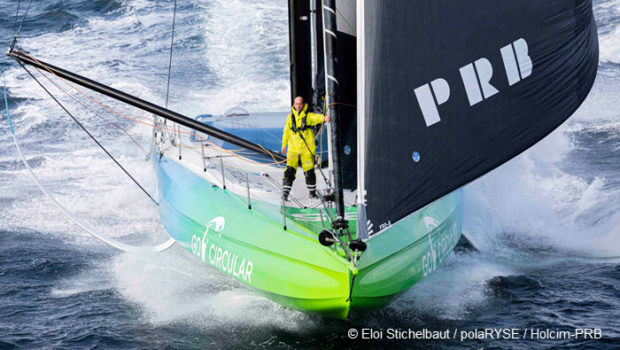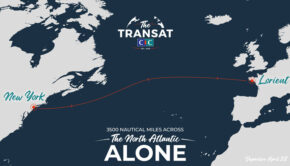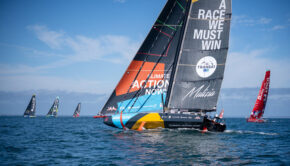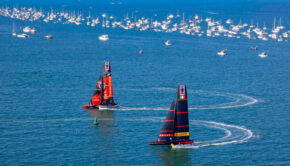Effort begins to clean-up sailmaking
Published on December 15th, 2022
The grand prix IMOCA is the leading offshore class for shorthanded racing, and in this report the organization details how they seek to reduce the impact that sail production for these 60-footers has on the environment.
In a new IMOCA production, a set of sails contribute to 1.4% of the overall CO2e emissions (source: 11th Hour Racing Design & Build Report 2021). An incremental contributor to these emissions is the waste from both primary (resin and fibers that make up the sail) and auxiliary (all the consumables: gloves, tape, paper etc.), to fabric (1 kg of sail requires 6 kg of material).
Michel Marie (Life Cycle Assessment Consultant) came onboard to assist IMOCA in developing the Green Sail Rule. “IMOCA decided to first assess the sails lifecycle to understand the hot spots within sail production,” he states. “It was through the LCA process that IMOCA was able to prescribe the Green Sail Rule and start tackling the major impact areas linked to sail production today.”
Through voluntary collaboration with the principal IMOCA sailmakers, the Class managed to pinpoint the key focal areas which would, in the short term, reduce impact. Today the Green Sail Rule will concentrate on the peripheral elements surrounding sail production.
These elements have been identified as three hot spots: waste, energy, and transport. The intention is to ‘clean up’ these first three sections before tackling the fundamental technology and materials within sail production.
“The IMOCA Green Sail is an exciting step forward that will motivate the sail making industry as a whole,” said Jono Macbeth, Sustainability Manager for North Sails. “The initiative forces manufacturers to evaluate and modify their processes to align with a more environmentally conscious outcome.
“North Sails supports this approach and sees it as the beginning of an exciting journey that will ultimately have a positive impact for all.”
Each sailmaker must prove a waste reduction to be considered as an IMOCA Green Sail Rule compliant sail manufacturer, as well as achieving over 25% energy coming from renewable sources and no aviation travel – they are encouraged to find the most sustainable and efficient means of travel possible.
“All Purpose is at the heart of ocean racing and has been actively working to reduce its environmental impact for several years,” explains Matthieu Souben, head sail designer at All Purpose.
“As a player in the IMOCA Class, it was an obvious choice to share and take part in the drafting of future requirements. It is a first step that we hope will evolve quickly to make environmental performance an imperative for a responsible and coherent ocean racing project.”
The arrival of the Green Sail Rule completes a sequence of moves from IMOCA. Already the Class has limited the number of sails to eight on board, as well as put in place a button system to track the sails bought and sold.
The addition of the Green Sail Rule compliments the manufacturing process as it “implies an increase in durability, and now, in-depth work on the materials and especially the waste caused during production,” describes Paul Meilhat, skipper Biotherm.
“For this last point, it is a whole process that must be questioned, as during the construction of boats we must find solutions to reduce the materials known as “consumable”. Finally, with our supplier Incidence we are very proud that our sails are entirely made in France.”
From the very first discussions the intent was to act regularly on the rule evolutions. This would allow for an evolutionarily rule that moves with the adjustments within the sail making sector. IMOCA and the sailmakers will therefore continue to meet in order to progress the rule over the medium to long term.
“Incidence Sails is pleased to have actively collaborated with the IMOCA Class to develop the first contours of green sailing,” said Pierre-Antoine Morvan, Head of the Offshore Racing and Super Yacht division at Incidence. “The IMOCA Class has been able to mobilize and assist the various actors, sailmakers and MarineShift360 to pragmatically assess the main points of progress.
“This approach corresponds perfectly to what Incidence wishes to implement with all its production. Even if the road to a completely green sail is still long, the evolutionary rule that resulted from this process has allowed us to lay the foundations for a transition towards the manufacture of sails that have less impact on the environment.”
IMOCA would like to thank all the sail manufacturers who participated in the Green Sail Rule and we are excited to continue developing this rule with them in the next few years.
Editor’s note: Racing sails in North America are rarely made in that continent, with sailmakers having moved manufacturing facilities to Asia. While this may be a cost saving scheme, it would appear the environment is paying a toll with the shipment of raw materials and finished goods.










 We’ll keep your information safe.
We’ll keep your information safe.